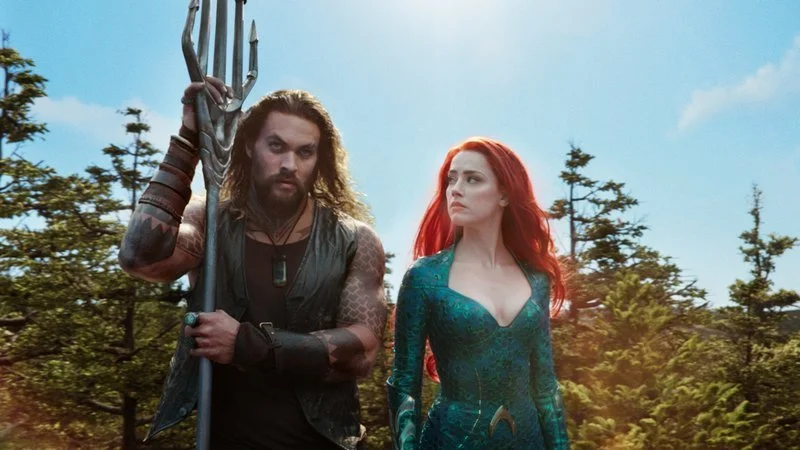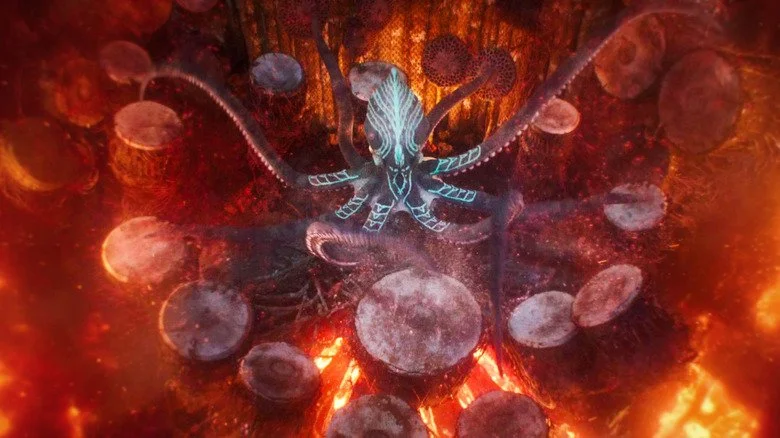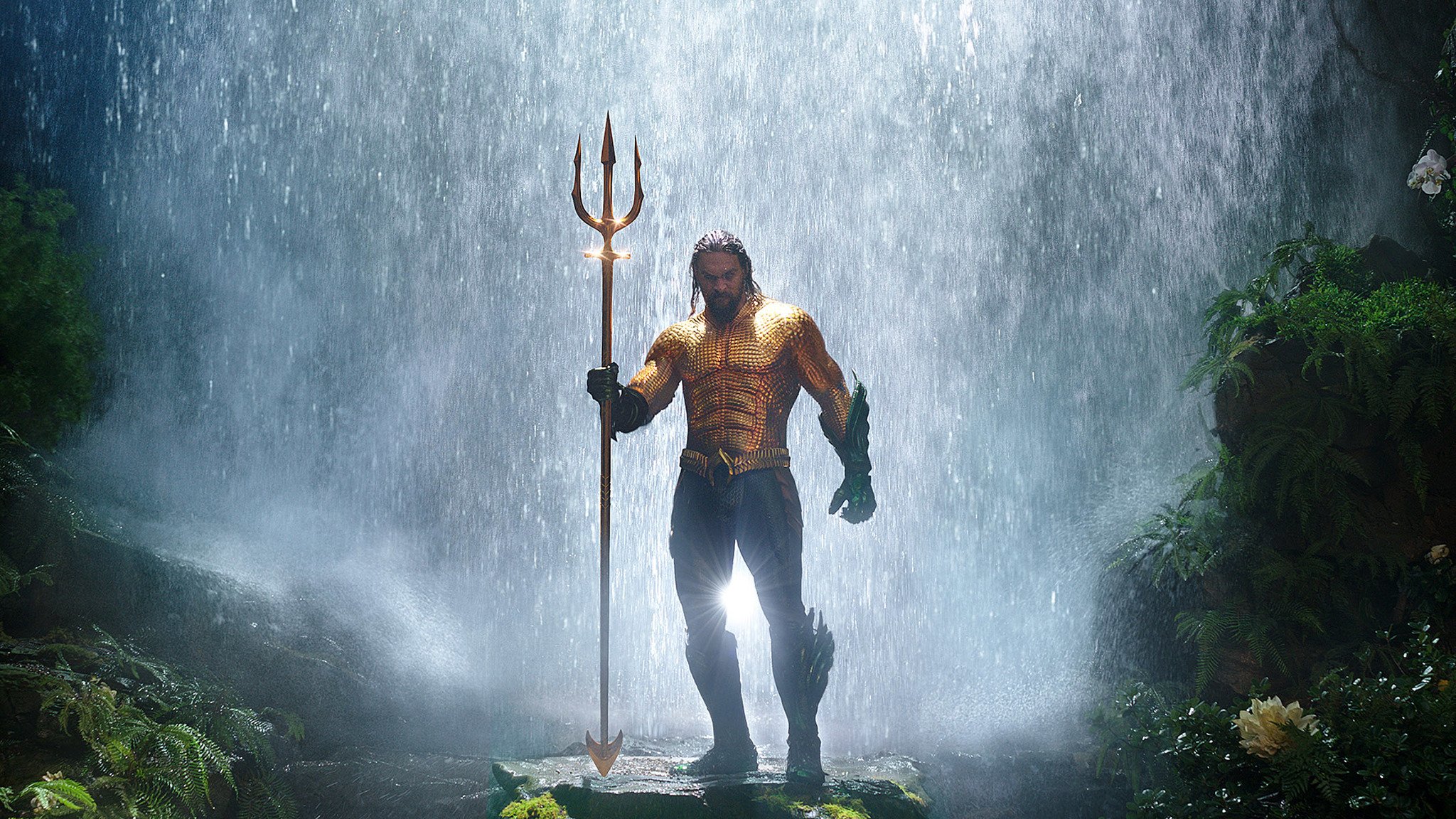Aquaman: A DCEU Retrospective (Part 6)
Rating – 6.5/10
**SPOILERS**
With the release of Justice League, the first phase of the DC Extended Universe’s history was done. We had seen the attempt to create an interconnected story, thematically and tonally distinct from that of Marvel, drag itself across the finish line with a whimper, slowly decimating its popularity with fans and general audience members. Suffice to say, it didn’t really work. So. Now what?
In the past 5 entries of the DCEU Retrospective, we’ve seen the initial vision for the franchise, Zack Snyder’s moody and darker take on comics lore seen in Man of Steel and Batman v. Superman, encounter pushback and gradual erosion, in efforts to strip away the darkness for something more consumer friendly. 2018’s Aquaman is the completion of this process, a vibrant, bright, and lighthearted film that embraces the sillier side of its source material, and fully rejects the stylings of Snyder. Here, the DCEU finally loses the last of its grounded nature and takes on a more MCU-esque tone. It feels like a betrayal of the original creative idea, a creatively bankrupt decision made by a studio looking for the easy way out.
It’s also just really, really fun.
Aquaman is a film centered around Jason Momoa’s title character, also known as Arthur Curry and previously fully introduced in Justice League, as he is forced to come to terms with his heritage and destiny as king of the undersea nation of Atlantis. Released in December of 2018, more than a year after the release of the DCEU’s previous film, Aquaman is another DCEU film to suffer from no real major production issues or studio interference. It seems as though director James Wan was largely left to do as he pleased with the film, and once again, this results in one of the better films in the franchise.
Visually, this might be my favorite film in the DCEU so far, and that’s a huge reason as to why I rate this so highly. The sheer amount of color is gorgeous, and the world of Atlantis is incredible to look at. The art department and visual effects teams create a stunning undersea world, mixing science fiction imagery and designs based on aquatic life to create something that took my breath away with nearly every shot. The production design in this movie, with its mix of sci-fi and comic book elements, is immaculate.
I would’ve thought that rejecting Zack Snyder’s style for something that embraces a lot of comic book designs would be a lot more controversial, but I haven’t really seen anyone complain much about this, and I think that speaks to the strength of how good these comic book elements work. Jason Momoa, gets to don Aquaman’s previously mocked orange and green comic book outfit, and it looks incredible on screen. The costume and set design departments also do great work. The comic accurate costumes translate really well to the screen, and I love the colorful, fantastical designs of the film’s vehicles, armors, and weapons, especially when they're practical. Those fully real suits of power armor worn by Atlantean soldiers, and the suit worn by secondary antagonist Black Manta, look so good.
James Wan’s directing really effectively pulls this all together. He lets the fantastic production design shine, and directs some of the cleanest action in the DCEU so far. The action scenes avoid some of the overediting and excessive slo-mo that’s plagued previous films, as Wan’s slick camera movements enhance fights between both single combatants and vast aquatic armies. The highlight to me is Aquaman and his love interest Mera (played by Amber Heard) being attacked by Black Manta in Sicily. The sequence follows Arthur’s fight with Black Manta and Mera’s rooftop chase with Atlantean soldiers concurrently, and I love how easily Wan is able to weave between these two set pieces.
I’d also like to take a moment to praise composer Rupert Gregson-Williams, who’s synth heavy score is just awesome.
Overall, Aquaman displays a willingness to embrace comic book cheesiness, and Wan and company use that to its full extent. They throw in massive battles with laser guns. They throw in action movie one liners. They throw in an octopus playing drums. They throw in a scene for James Wan to acknowledge his roots in the horror genre (the scene with the Trench creatures is another highlight). They throw in a Julie Andrews sea monster. There’s this feeling of anything goes, like the filmmakers are genuinely having a good time making this, doing whatever they want. That feeling is infectious. Aquaman is an unabashedly fun movie, and that’s largely caused by James Wan’s ability to pull all these different threads together and commit to how zany they can be.
I’m not going to pretend that everyone will love the goofiness of this movie. I’ve got no doubt that the sheer cheese and lack of seriousness will rub people the wrong way, and it absolutely does not mean that this is a flawless movie. Despite the entertainment factor and spectacle, there is definitely a fairly standard superhero origin story at its core. The script is also packed with several subplots, and while the story is able to balance them well enough to avoid Batman v. Superman levels of messiness, certain story aspects and characters don’t get the attention they need to truly flourish. Arthur’s arc and love story with Mera could use a little more time to be truly effective, and actors such as Nicole Kidman, Dolph Lundgren, and most of all Willem Dafoe feel wasted in underused roles. The dialogue is also rough in many places, with long bouts of clunky exposition explaining Atlantean customs and politics.
It should also be noted that the CGI is often an issue with this film, in spite of the often gorgeous visuals. Landscapes and locations are great looking, but digital character models are often jarringly unrealistic, most notably in Arthur’s trial by combat against his brother, main antagonist and Atlantean king Orm, played by Patrick Wilson. There are also several scenes with green screens that look unfinished, especially in the Atlantean throne room.
These flaws are notable, but ultimately Aquaman has enough high points and entertainment value to overcome them, as long as you don’t necessarily expect high art. Of course, Jason Momoa is a huge help with this. While Justice League underused him, here Momoa can flex his charisma and comedic timing. He’s also able to sell Arthur’s arc about his self doubt, even if that storyline is held back a bit by a lack of screen time. On a similar note, while Arthur’s relationship with Mera remains a little underexplored, when it gets the spotlight Momoa and Amber Heard do have strong chemistry, and I think with a little more screen time their relationship could have been a highlight of the film. Amber Heard is admittedly a bit wooden at times (her last line after the final battle in particular feels like it really needed another take), but she absolutely holds her own in action scenes, getting a few standout moments (she takes a bunch of wine and turns it into flying wine knives and it’s pretty sick). Patrick Wilson also makes for a solid villain overall, even if he’s prone to dramatic war cries that sound hilariously unintimidating and is completely one upped by Yahya Abdul-Manteen II as Black Manta, a far more scene stealing villain.
There’s an unassuming quality to Aquaman. It isn’t burdened by having to set up any future films, and it’s able to simply tell its story and have fun doing it. Most importantly, there aren’t any obvious behind the scenes factors that make this a milestone in the DCEU’s doomed history, like with Suicide Squad or Justice League. This is in part due to an executive shake up at Warner Bros, as Walter Hamada would take over to oversee the DCEU, and push a plan to focus on standalone features over interconnectivity that had been in the works before even Justice League. This change in direction would later be a double edged sword for Warner Bros.
For now though, Aquaman is the first moment where the grounded and gritty vision for the DCEU disappears, and the studio execs at Warner Bros finally get to release a film that feels more like an MCU product, even if Wan takes some more adventurous leaps than the MCU would tend to do (delving into horror a bit for one thing). The film’s reception would guarantee the DCEU would never return to the original grounded nature: despite middling reviews, Aquaman became the first and only DCEU film to gross a billion dollars. Aquaman is an alright movie. It’s a lot of fun, a lot of it looks fantastic, its worst performances are still perfectly fine, and its embrace of cheese and comic book elements make it a refreshing change of pace from the previous installments of the DCEU. However, if Justice League was the killing blow for the darker, grittier ideas behind the DCEU, Aquaman was the undertaker filling in its grave. This is how the next phase of the DCEU was going to be. The question was, could the new style maintain it?







